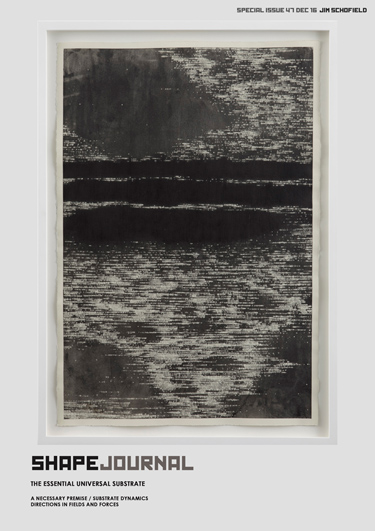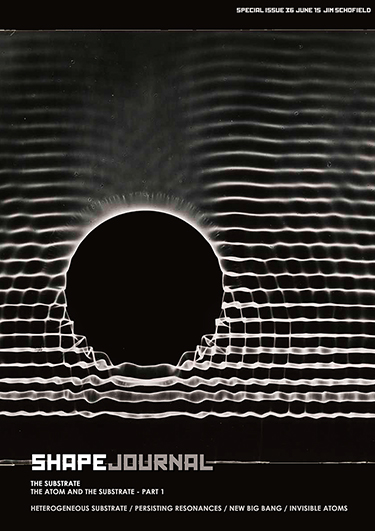The Necessary Role of Philosophy in Science
On reading a collection of short articles under the general title of
The Unknown Genome in New Scientist (2765), I realised that I had perhaps hit pay-dirt with regard to my own ideas on the possible policing of genetic materials within all organisms.
I found, in this series, substantial evidential support for some of the hypotheses I have been formulating about this area, particularly in the maintenance and policing of the genetic material (though, of course, my considerations were, perhaps surprisingly, almost wholly philosophical).
NOTE: A fuller discussion of the content of the above mentioned series in New Scientist will be addressed in a separate paper on completion of this one.
I am no professional biologist, and I must depend wholly on those who are, for the content that I must attempt to make sense of. So, I hadn’t arrived at my suggestions via personally-newly discovered concrete evidence, but, on the contrary, solely in response to my dissatisfaction with the usual consensus explanations of Mutation and Species Change, and involving possible alternative accounts of my own.
The usual explanations were much too hit and miss, and as is usually the case, often latched onto the ubiquitous use of Randomness to “explain” everything!
No, I was convinced that Life would immediately and vigorously react to mutation damage to its absolutely vital genetic materials, and hence, apart from Natural Selection of the adult phenotype, other processes would occur within the genotype to remove, alleviate, or “wrap-up” and store any genetic damage, which, by some set of criteria was labelled as wholly deleterious.
I must admit that while I am not a biologist, I have always been very interested in all aspects of the subject, and have followed developments closely. I have never been taught the subject at any level, and my experimental experience was, and still is, is precisely NIL.
But I am by no means un-informed. I have been reading extensively on this subject for over 40 years, not to mention on many other very wide-ranging areas, and was indeed extensively educated as a scientist and mathematician, prior to changing my specialisms several times, and even achieving a professorial appointment in one of these latter areas.
So, what is it that I must have been doing to now attempt to integrate such state of the art discoveries into my own propositions?
The resonance between what these real biologists were finding and my suggestions as to what I considered were necessary processes have been surprisingly close. The usual response to such a person as myself making any worthwhile contribution at all on such a specialist subject is universally agreed to be of minimal value.
But such a reaction is not always justified.
And this same situation has occurred several times for me in widely different disciplines. It has even occurred within my legitimate disciplines of Physics and Mathematics, because I was “making judgements well outside my specialist areas”. More expected similar responses have been coming my way in many other areas from Painting and Sculpture to even Dance at one extreme to Geology, Politics and Pedagogy on another. Yet, though such condemnations would usually be correct, they will not always be so. It will depend on how such a wide range of subjects are considered by the outside interloper.
It will most certainly depend on his ground! In other words it will be basically determined by how that person deals with knowledge and understanding from disparate areas: it will depend on his worldview.
Specialisation does indeed allow a remarkable focus to be achieved and discoveries to be made. It is, of course, essential for each and every serious area of study. But it is also invariably what I term a Head-Down approach. It limits the considerations of the expert to his/her own narrow area. And it must be contrasted with a Head-Up approach, which builds its worldview out of the widest possible Knowledge and Understanding.
It should really be the approach of the philosopher, but even there it is rarely the normal mode.
All problems, no matter what the specialism, will not be solved by concentrating only within that specialism. Indeed, along with the accumulated wisdom of that specialism, such a limitation will also justify and firmly embed in addition its current assumptions and errors. Many practitioners will never see the wood for the trees. And a generalist approach can, and sometimes does, reveal things invisible to the Head-Down expert.
A real philosopher MUST be multi-discipline, if he/she is to benefit from human gains across the board in understanding the World. All understanding is, of course, social, but it is also multi-discipline. Even the greatest specialist experts show almost unbelievable errors in their generalist thinking.
It is almost universally true that all specialists make rubbish philosophers. And they also cannot switch disciplines and produce as good work thereafter as they did in their own prior area.
To give an exemplar of this which may establish my own approach, I will relate the experience of my major diversion into Dance!
I have become the leading author of Multimedia Resources for the Teaching of Dance (along with an excellent Dance specialist colleague). And this situation was established some 21 years ago, and has remained the case ever since. In addition I also designed a teaching aid for Dance Teachers employing Rudolf Laban’s ideas in their area, and related to his famous Labanotation – the world-wide employed method for recording Dance.
In that very different world, I became an expert in Computer Systems and Programming, not only producing that high point of systems design – a machine independent compiler, but finally achieved a post as Director of Information Technology in one of the colleges of the University of London. I had received zero instruction in computing also.
But, I was always a
Head-Up philosopher, and every discipline was relevant to that! Recently I have been making significant contributions in the
Theory of Emergences, as applied to the Origin of Life on Earth and to its subsequent Evolution.
Have I any right to tackle such problems? Many would tender an emphatic, “No!”, but they would also be mistaken.
In the last five years I have again changed course and spent all my time writing about Philosophy and now run an online Journal (SHAPE) concerned with Philosophy and it is full of new and legitimate ideas.
Now, at this point, the reader may well be yawning at “my efforts to show how clever I am”, but they would be mistaken if they are. I am, and purport to be no genius.
I got a lower second in Physics from Leeds University, and was throughout my education damned with the faint praise of “promising”. No, my descriptions of what I do are not to establish any sort of superiority, but, on the contrary, to reveal an approach that enables me to address such a very wide area of disciplines and to do something worthwhile in every one. It is because I am, and always have been, multi-discipline in my interests. NO! “Interests” is much too weak a word. I should have said “concerns”.
And though much of conventional education is to tell us HOW things happen, I always wanted to know WHY they happened the way that they did.
AND I demanded (of myself) a philosophy that could face all ways, and cope with all expectations. After all, what is the use of a philosophy that is strictly limited to a specific discipline – as, for example, the current consensus in Sub-Atomic Physics – the Copenhagen Interpretation of Quantum Theory and its various developments.
Not only should my philosophy be entirely general, but it should never be only an academic subject.
As Robert Pirsig tried to insist in Zen and the Art of Motorcycle Maintenance, Philosophy is for every day! It should illuminate your life and purposes, and it should never be second hand!
Though you may, and indeed frequently have to, take on what you learn from others, you must never be converted “hook, line and sinker” for most of what you “take on” as your position, you will not fully understand if you do.
But, if, on the other hand, what you learn from others must be integrate-able with what you already understand, it will be very different. It may be difficult to achieve such integration, but without it, you really have nothing new to take on.
What you have learnt cannot actually mean anything!
Of course, if your “core” is constant and immutable, you will also be in deep trouble! Integration is a two-way process, and its successful achievement changes the receiving “core”, and frequently the new material too. Indeed, the greatest understanding comes only from transcending what appears to be unbridgeable contradictions between what you already understand and what you are trying to integrate.
The reason for such an impasse is always that your usually-inviolate assumptions are incorrect, and the only way to traverse the seeming full-stop is by a radical change in those assumptions.
I have recently been fascinated by Evolution and have even written a paper entitled
Truly Natural Selection, which generalised Darwin and Wallace’s Natural Selection to apply also to non-living, purely-chemical processes by means of a very different selection process.
My
Theory of Emergences tackles the trajectory of Emergence Events such as the Origin of Life on Earth, NOT particularly, of course, but generally as a revolutionary interlude in the on-going Evolution of Reality. It concerns itself with the form or shape of the episode – its turnovers and consequent phases until there is some sort of resolution in the establishment of a wholly New Level.
What has therefore emerged is extremely surprising!
The assumption that minor constructive processes prior to such an Event actually precipitate a whole new Level determined by the direction of those prior processes is shown to be totally INCORRECT! The nature of the new Level does NOT emanate from changes in the prior Level at all. The only thing that within-Level processes can produce is a catastrophic collapse of the prior system, and that is very different indeed from the usual assumption.

Indeed, it is ONLY the Second Law of Thermodynamics type sub-processes that bring about the demise of every Stable Level.
The first phase in an Emergence is the opposite of anything emerging: it is composed of a catastrophic collapse of the prior stability, which then seems to be hurling headlong down to total chaos.
But it doesn’t!
The dismantling of the stability-ensuring processes within the previous Level, plus its history and still-remaining, productive-process content, allows new things to occur, which within the stable Level were prohibited, and a brief period of remarkably diverse and numerous processes leads, by a selective process to the creation of entirely-new proto-systems. Nevertheless, these quickly generate their own Second Law curtailing, and this leads into a period of oscillations between creation and dissolution, which nevertheless gradually ascends to a point where a completely new and self-maintaining Level is established and PERSISTS!
It is no empty myth, when legend talks of the Phoenix arising from the flames of destruction.
That is the ONLY way that the wholly NEW can ever emerge!
The real myth is that which asserts that innovation can be achieved by small quantitative and incremental steps - it cannot.
Now, interestingly, my work on Emergences naturally progressed to seeing what their role must be in the actual Evolution of Life, and many questions immediately arose about our universally agreed assumptions of how new species emerged, and also how matter ascended from inert particles to produce Life, Humankind and indeed Consciousness. The incrementalist myth would just NOT suffice, for such a remarkable trajectory, and all our basic assumptions had to be thoroughly investigated.
My work in this area (remember I am NOT a biologist) has recently been confirmed by a whole series of unconnected discoveries by real experimental research biologists in the various academic Journals and Magazines.
The point of this paper is NOT self-congratulation, but instead to try to reveal why an ordinary man from a poor working-class background (my grandmother could neither read nor write) could be in a position to make such significant contributions.
It HAS to be important, and though it may dismay the elitists and the privileged, it should encourage all who really want to understand the World, rather than merely join-the-club, accept the consensus, and live comfortably.
But, the barriers to doing it are indeed considerable, I must admit! Such researches are MORE than a full time job and you have to earn your living.
I chose, and luckily it was the correct choice, to be a teacher, and have taught at every level of Education from lower schools to Universities. But to get anywhere I had to move fairly frequently. I had eight posts culminating in my Directorship at Goldsmiths’ College, and always tackling new things.
At Goldsmiths’ I devised and commissioned the first Campus-wide Fibre-Optic Network in any of the Colleges of London University, while in Glasgow I had to turn myself into a systems expert to set up an appropriate teaching-orientated computer network and system for an educational institution at the highest level, and also to become an expert in Computers-in-Control to help many researchers with their chosen questions.
The thing is to tackle what needs doing, and learn as you go. Nevertheless, you do not have to have a goal from the start. It expands with each new job and the challenges they deliver. I seemed to arrive at a professorial level final post by a totally unplanned route. (Though I often spent very long periods in a given post, because the job demanded it).
But, what does happen is that as your achievements are your own, and never facilitated by contacts and influence, you gain in both reputation and confidence.
From an initially shy working class boy from West Gorton, Manchester, I am now a confident philosopher! How about YOU?






































